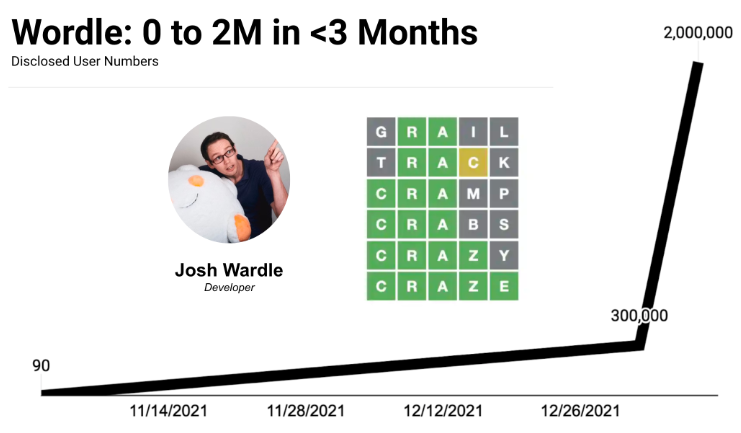
September 4, 2024
A straightforward word game called Wordle has gained worldwide popularity and created a whole new avenue for successful internet marketing. The objective of the game is to predict the daily five-letter word in six tries, if you’re not familiar with how it operates. Perhaps that’s what makes it so beautiful. Below, we’ll analyze Wordle’s reasons for such success and the lessons marketers may take away from it.
Quick Links
What is Wordle?
You have six chances to predict a word with five letters. A 6×6 grid is created from each guess, and it indicates whether or not your guess and the correct word share any letters. When a letter is positioned correctly, it turns green. And when it is incorrectly positioned, it turns orange. And when a letter is not there in the word at all, it turns grey.
That is the only thing involved. Everybody has the same one word to guess each day, and after six attempts, there are no more guesses. A fresh word awaits you the following day when you awaken.
Although it may not seem like much, Wordle has had incredible success. Between January’s first two weeks, the number of players increased from 300,000 to 2 million. Celebrities ranging from Jimmy Fallon to Richard Osman regularly tweet their results from the game on social media, making it a top trend on Twitter. It also served as inspiration for Wordle, a five-year-old software that started enjoying success unconnected to this one.
Why is Wordle so popular?
Josh Wardle, the app’s inventor, never meant for Wordle to become as well-known as it has; it is a non-profit. But a great number of individuals are concentrating on it for five to ten minutes each day. Why? The majority of people attribute it to Wordle’s ease of use.
No obtrusive in-game advertisements, no registration, and no sign-up forms are present. Simply open a website while enjoying your morning coffee, traveling, or lounging on the couch, and you’ll be able to compete with people worldwide to guess a new word in the fewest attempts.
Wordle Solver is also available in the market to make this game easy.
However, Wordle’s enormous success can also be attributed to the spread of word about it via social media. Playing it is simple, and sharing your results on WhatsApp or Twitter with a little humour is equally simpler.
6 Lessons for Digital Marketers
The following are the six key lessons that marketers can learn from Wordle:
Small Victories in Trying Times
Since we are all experiencing this protracted pandemic together, we could all use a little victory now and then. With so many five-letter words in the English language, Wordle could seem overwhelming at first. But it’s actually meant to be a “agency-expanding game” where players feel more in control and closer to the objective as they play, mostly through the process of elimination.
Stated differently, Wordle is not overly challenging for the majority of players, but it is challenging enough to make you feel smart and release dopamine when you figure out the solution. You don’t need to spend a lot of time on Wordle because there is only one puzzle per day. But it is a very habit-forming game.
This widespread need for little everyday successes highlights chances for brand marketers to create straightforward, user-friendly experiences that consistently reward and satisfy customers without requiring a lot of work. Brands have a variety of methods at their disposal to reward their customers and maintain their engagement, whether it’s through loyalty points or special access.
Keep it simple
To play Wordle, all you need is an internet connection, a device (laptop, tablet, or smartphone), and an open mind. The idea is as simple as it is brilliant: you have six chances to figure out a five-letter mystery word. The game ends after you lose unless a new word is posted the next day. All you need to do to generate an emoji of your efforts if you are successful and wish to demonstrate it is to hit “share.”
Wordle is a refreshingly pure user experience in an increasingly bizarre internet environment. No obtrusive advertisements, bothersome pop-up videos, or solicitations for payment are present. That might change in the future—the New York Times recently purchased it. But for now, it feels like the WhatsApp puzzle that Wardle created to entertain himself and his friends and family.
Shareability is key
Wordle has executed a masterclass in shareability, the most significant marketing advantage of social media. Once you finish a Wordle, a webpage overlay appears with a bar chart displaying your guesses for placement and a single “Share” button.
You can easily copy and paste the emoji mockup of today’s guess placement to your preferred social media by clicking this button, which copies it to your device’s clipboard.
It’s crucial to remember that Wordle didn’t start out with this feature. Rather, Andrew Wardle decided to add it in after observing in the middle of December that some players were manually typing out their results and patterns using emojis.
As marketers, it is our duty to stay current with community ideas so that our media remains relevant and fresh. Community ideas are an incredibly powerful tool in the social media marketer’s toolbox.
Don’t be afraid to target niche audiences
Wordle was created by Andrew Wardle for his girlfriend, who enjoyed word puzzles but was unable to locate an engaging one online. Millions of people all over the world loved it, and he created it specifically for her. Because it was made with a certain person’s preferences in mind, the game has a personal touch that contributes to its success.
It’s normal to be concerned about your audience’s reaction when producing material for social media. People have varied tastes, and they have an impact on your success.
Your creations may be adored by some people and disliked by others. But if you make an excessive effort to win over everyone, you risk creating something that is too formulaic and unremarkable.
Don’t overthink things, but it’s crucial to know what your present followers find enjoyable. Prioritize maintaining a happy audience while expanding gradually. The secret to success on social media is that.
Less is More and No Barrier to Entry
Wordle takes a different tack from typical games, which encourage you to play them for longer periods of time until you become addicted. Since they can only guess one word per day, most users only play Wordle for a few minutes at most each day.
Josh, the creator of Wordle, claims that his innovation in making the game become popular was restricting players to one puzzle per day. It has, he continues, helped maintain a sense of scarcity.
Conversely, Wordle is compatible with all kinds of devices. To play it, you may either download their app or open their website on a laptop or mobile device. You don’t have to register. The main incentive for additional people to try the game is its seamless experience. It is recommended that players register only after they correctly guess the word in order to preserve their streak and score.
The Art of Doing Less
Wordle’s simple charm and viral success come from its creator’s choice not to make money from it, even though his website gets millions of visits daily. This is unusual in today’s internet culture, where many try to profit from every viral trend.
Profiting from a well-liked concept is typical, and not everyone can afford to omit this stage. Nonetheless, Josh Wardle’s choice to maintain Wordle free of advertisements has improved his image, and gamers value not having pop-ups or advertisements irritate them.
Since Wordle doesn’t require registration, it doesn’t collect personal information. It also aims to be low-pressure, with just one puzzle per day rather than being addictive.
It’s easy for digital marketers to never stop looking for new gamification techniques and audience engagement strategies. However, Wordle’s success demonstrates that, on occasion, simplifying things and eschewing intrusive marketing strategies can improve user experience and increase buzz.
Close up
Virality is influenced by several factors. Some aspects are just beyond anyone’s control, even though some can be designed into the game—as Wordle demonstrated.
While viral growth should be the primary goal for gaming firms, it’s also critical to comprehend consumer behaviour and develop a tailored customer engagement approach. Additionally, marketers can quickly obtain pertinent data about their clients and interact with them successfully if they have the appropriate tools.





